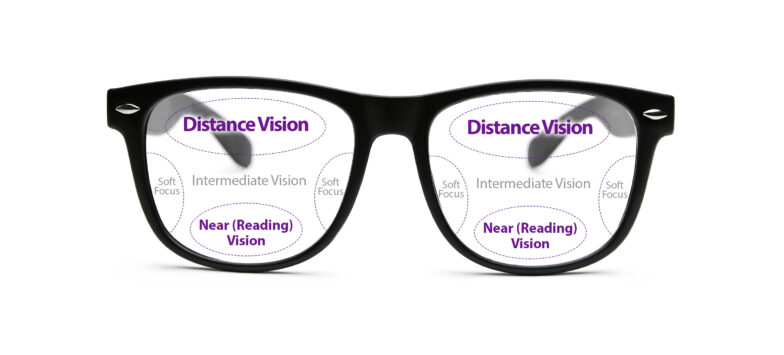
Progressive Lenses – Are They For You?
Starting around age 40 and as we age, we may begin to notice changes in the ability of our eyes to see clearly at various distances. The ability of our eyes to change focus between near, middle, and far distances tends to diminish as we age.
Progressive eyeglass lenses are designed to enable you to see clearly at all 3 distance levels with only one pair of glasses. So if you’re driving, for example, you can look at your dashboard, at the road, or at a sign in the distance with a smooth transition.
These lenses have become very popular, but they’re not necessarily for everyone. Let’s look a little more closely at how progressive lenses work, and some of their pros and cons.
What is a progressive lens?
These lenses have a seamless increase in magnification from top to bottom. You look through the top portion of the lens to see far-away objects, the middle to focus on intermediate objects, and the bottom to see things close-up.
Pros of Progressives
• You only need one pair of glasses, instead of switching between single-vision eyeglasses for distance and separate reading glasses for near work.
• The prescription changes gradually across the lens surface, making a gentle transition and avoiding the “image jump” that people experience with bifocals or trifocals.
• No telltale line(s) across the lens – progressives look like regular glasses.
• Progressive lenses can be used for children, too, to prevent increasing myopia (nearsightedness).
Cons of Progressives
• It takes time to adjust to progressives. You need to train yourself to look out of the correct part of the lens for near, middle, and far distances. Some people never adjust, but most do.
• With progressives, it can be challenging to find the “sweet spot” for certain distances when doing near activities for prolonged amounts of time.
• Progressive lenses can cause peripheral distortion when moving your eyes from side to side.
• Progressive lenses cost more than traditional bifocals.
If you decide to give progressive lenses a try, have your lenses customized and fitted by an Atlantic Eye ophthalmologist or optometrist, who will also advise you on how to reduce the adjustment time needed. As we transition from summer to fall and into winter, let’s make vision and eye health our prime focus. Call or text for an appointment at one of our 4 office locations.
